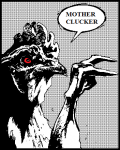Posted 26 April 2012 - 09:37 AM
Holy shit Amph. That was an amazing post. Rep coming your way when my stores have recharged.
I will start with a question: why do you think there are few complex, well thought out books on the markets these days, or in other words, why are authors not stepping it up especially when SF literature can be so cookie cutter?
I think the reasons are two fold: first of all, complexity doesn't usually sell. I believe TV gives us the clearest examples here. Recently we have seen several series have one or two seasons before getting canceled (Fast Forward, Happy Town, V, Better off Ted). While some of this may be due to deficiencies in acting and story line, it also seems that the more complex a TV series is, the worse ratings it gets and the faster networks put the series. I mean there are plenty of contradictions of course (BSG, Lost), but in the end, I think the reason is people don't watch TV to think, which is the second reason there is little complexity on the market in SF. They want entertainment, the more spoon-fed the better. If one has to sit up and pay attention closely to work out the plot, less people are willing to persevere.
In terms of books, one could see this as smart fantasy books don't sell. Again, exceptions such as the ones mentioned in your excellent post. However, I believe that people don't want to think. They don't want to put the effort into scrutinizing and mulling over their SF fiction. They want boobs, explosions, and clever one liners (more so in TV... but still). And publishers recognize this. And without publisher backing, the intricate novel either takes a long time to break through or never sees the light of day.
I agree Amph that ideally I wish there were more books of SE quality on the market. Some of the pulp out there is nauseating. But on the other hand, there are numerous clever series that don't reach the depth of SE's books and are "lazy" in their treatment of complex issues like racism.
And that is ok. Much of the population seems to want the pulpy over the complex. It's economics, and I'm sure there are authors like SE who are not publishing because of this trend in the readership. And if authors can work through this system, putting out novels that are compelling despite their less well thought out setting, I applaud them. I will enjoy a good book even if it doesn't excel in its treatment of societal intricacies. And in the end, if anyone is to blame, it's the readership and their simple, flashy tastes.
And a quick word about history. Amph, I admire people like your grandmother, please do not get me wrong. I love the stories they discover among the potsherds. I am not arguing that archeologists and historians are lazy, imprecise or careless. I am arguing that even knowing a people evidently protected temples and rich people with walls, leaving the poor to rot outside the walls, we do not have a good grasp on how people thought. We can try to infer attitudes, such as the majority of people revered the religion of their temple. But remember that it only takes one rich influential person to create a temple, and that this sponsor could be unreligious, currying favor with someone that is, or some other motivation. We don't know. Probabilistically, the temple was build because people valued that religion. But even today, the structure of things is deceptive and in the right circumstances, the mindset of the few can determine the course of the many.
This is why I think we can never truly know the people of the past. Their setting, their weather, their movement, yes. Their personalities, their hopes and worries, their motivations, their worldview, no. Writers rarely write down all of what they are thinking and often see the world through their own lenses. And authors often are personalities, eccentric in their own way, as many academic people are. I would find it hard to dig through such bias to get to the true meat of the past.
And the superstructures, the walls, the city layout do tell us how people lived (in filth or in wealth, under protection or openly) but it doesn't get into the minds of those people.
To try another approach, look at an actor or actress. One can have a lot of opinions on what they are like. But, one cannot tell what the person is truly like until one sees them outside the movie and the media's attention, in person. Media skew things. Actors and actresses put on a show when in public even if they are not in a movie. And unless we get an interview or a post movie commentary, we really would have a hard time knowing what the person was like.
I see historical writing and archeology like this. We can watch the past and see the polished remnants of peoples thoughts and records, and see the rubble that was the world in which they lived, but we would need to be with the people to even start guessing at what they were like, what they thought, etc. And even then, I am not so sure we could truly understand them, because I don't think we can truly understand those alive that we interact with in this day and age.
The examples you give that the beginning of the post Amph are all mechanics, representations of distribution and functionality. I agree those are beautifully deciphered by archeologists and historians. But you don't mention how those things tell us what people really thought of each other, how they behaved, what their worldview was. Those things told us how we would see the past if we stood within it, but the bodies around us would be more automatons than actual people. The minds of people are far more complex than the boxes they live in.
"You don't clean u other peoples messes.... You roll in them like a dog on leftover smoked whitefish torn out f the trash by raccoons after Sunday brunch on a hot day."
~Abyss
 Gust Hubb, on 25 April 2012 - 04:37 PM, said:
Gust Hubb, on 25 April 2012 - 04:37 PM, said: QuickTidal, on 25 April 2012 - 05:26 PM, said:
QuickTidal, on 25 April 2012 - 05:26 PM, said:
 Help
Help

















